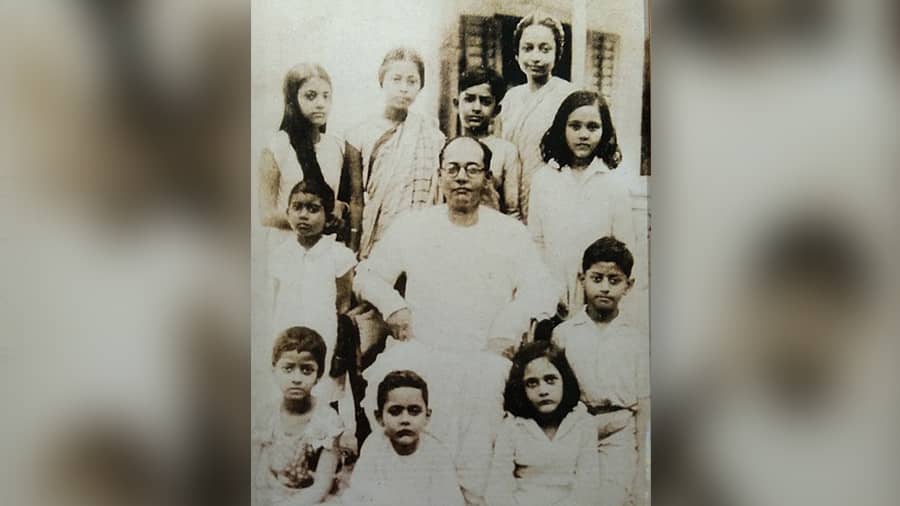The only bedtime stories that my mother Roma Ray would tell us when my siblings and I were little were those of her Uncle Subhas.
We would listen with wide-eyed wonder at how he pulled the wool over the eyes of the British Intelligence and drove out of his Elgin Road residence on a cold January night, of how he trekked through the Khyber Pass in disguise or how he made a submarine voyage from Europe to Southeast Asia. But everyone knows the stories of his intrepidity and sacrifice. It was ‘Subhas the family man’ that emerged through her recollections that we came to know and love. Even at 93, my mother is motivated by memories of this gentle and affectionate relative who was a friend, philosopher and guide to his innumerable nieces and nephews.
On many an occasion, Subhas would land up unannounced at his elder brother Sarat Chandra’s holiday home in Giddapahar in Kurseong. Once there, he was a completely different person, free of his political obligations. He would spend time with his nieces and nephews (who called him Rangakakababu) chatting and even playing games with them! Once while playing ‘hide and seek’ with the younger children, he missed his step, fell and rolled down the hillside. The children ran down after him to find that he had cut and bruised himself. Sarat Chandra’s wife, Bivabati, reprimanded the children for having caused the accident, but Subhas simply got up, dusted himself down and urged the children to resume the game!
Finding a a confidante in Uncle Subhas
When his nieces and nephews were a little older, they found in Uncle Subhas a confidante, someone they could turn to when they needed to be comforted. One such person was my mother’s sister and Subhas’s niece, Gita. Unlike many in the family, Gita was dark-skinned, and consequently, at the receiving end of disparaging remarks about her complexion from some older members of the family. Very upset by these barbs, she once rushed to her Rangakakababu and burst into tears telling him how hurt she felt about this. Her uncle comforted her and told her to tell these relatives in the words of Rabindranath Tagore: “Kalo? Shey jotoi kalo hok, dekhechi taar kalo horin chokh!” (Dark? No matter how dark she is, I have seen her black doe eyes!) This tender and sensitive counsel immediately cheered Gita up and made her feel stronger. This marked a small but significant turning point in her life, and she thereafter faced it with a newfound confidence.

Netaji with nieces and nephews Piali Ray
The two brothers — Sarat and Subhas — shared a unique bond. Whether it was advising him on political matters or financing his political career, Sarat Chandra was always there for his younger brother. Indeed, when Sarat Chandra was once asked if Subhas or his own children mattered more to him, he replied without a moment’s hesitation that the scale would always dip heavily in favour of his brother! Such was the great love and affection they felt for each other. Subhas was always conscious of his brother’s greatness and political sagacity, and the love that he had for him in time transformed into reverence.
While reflecting on her father Sarat Chandra, my mother would quote the Sanskrit sloka:
Pita swarga, Pita dharma, Pita hi Paramang Tapo
(My Father is my heaven, my father is my dharma, he is the ultimate penance of my life.)
The question of ethics was non-negotiable
Even at her advanced age, she turns to the memory of her father for solace, inspiration and hope. Sarat Chandra was a busy barrister and a committed freedom fighter who had little leisure time with his children. But the principles he espoused became the cornerstone of their upbringing and culture. Sarat Chandra believed in the value of character and discipline with special reference to political life, and said that “he who is morally wrong can never be politically right”. This value was to be applied not just to politics but to the entire spectrum of life’s valuation. Whether at home or elsewhere, the question of ethics was non-negotiable. A hundred ‘rights’ could not and would not compensate for one ‘wrong’. Ethics and moral discipline built character, guided behaviour and made you the kind of person you wanted to become. This was the value system in which my mother and her siblings grew up, and I believe it has stood her in good stead. Sarat Chandra appealed to the students and youth to emulate “the example of Netaji” and to “work that your Motherland may prosper; suffer that she may rejoice”. My mother regrets that the present generation of Indian politicians have failed to carry forward this legacy.
Piali Ray is the granddaughter of Sarat Chandra Bose and grandniece of Subhas Chandra Bose. She is a teacher and an actor of repute.